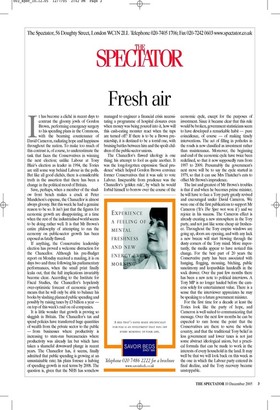Fresh air
It has become a cliché in recent days to contrast the gloomy jowls of Gordon Brown, performing emergency surgery to his spending plans in the Commons, with the beaming countenance of David Cameron, radiating hope and happiness throughout the nation. To make too much of this contrast is, of course, to underestimate the task that faces the Conservatives in winning the next election; unlike Labour at Tony Blair’s election as leader in 1994, the Tories are still some way behind Labour in the polls. But like all good clichés, there is considerable truth in the assertion that there has been a change in the political mood of Britain.
Save, perhaps, when a member of the shadow front bench makes a crack at Peter Mandelson’s expense, the Chancellor is almost always gloomy. But this week he had a genuine reason to be so. It isn’t just that the figures for economic growth are disappointing, at a time when the rest of the industrialised world seems to be doing rather well. It is that Mr Brown’s entire philosophy of attempting to run the economy on public-sector growth has been exposed as fatally flawed.
If anything, the Conservative leadership election has proved a welcome distraction for the Chancellor. Although his pre-Budget report on Monday received a mauling, it is on days two and three following his parliamentary performances, when the small print finally leaks out, that the full implications invariably become clear. According to the Institute for Fiscal Studies, the Chancellor’s hopelessly over-optimistic forecast of economic growth means that he will only be able to balance his books by slashing planned public spending and possibly by raising taxes by £3 billion a year on top of this week’s raid on oil companies.
It is little wonder that growth is proving so sluggish in Britain. The Chancellor’s tax and spend policies have transferred huge quantities of wealth from the private sector to the public — from businesses where productivity is increasing to state-run bureaucracies where productivity was already lax but which have taken a shameful downward plunge in recent years. The Chancellor has, it seems, finally admitted that public spending is growing at an unsustainable rate; his plans foresee a halving of spending growth in real terms by 2008. The question is, given that the NHS has somehow managed to engineer a financial crisis necessitating a programme of hospital closures even when money was being poured into it, how will this cash-eating monster react when the taps are turned off? If there is to be a Brown premiership, it is destined to be a torrid one, with bruising battles between him and the spoilt children of the public-sector unions.
The Chancellor’s flawed ideology is one thing; his attempt to fool us quite another. It was the long-forgotten expression ‘fiscal prudence’ which helped Gordon Brown convince former Conservatives that it was safe to vote Labour. Inseparable from prudence was the Chancellor’s ‘golden rule’, by which he would forbid himself to borrow over the course of the economic cycle, except for the purposes of investment. Since it became clear that this rule would be broken, government statisticians seem to have developed a remarkable habit — pure coincidence, of course — of making timely interventions. The act of filling in potholes in the roads is now classified as investment rather than maintenance. Moreover, the beginning and end of the economic cycle have twice been redefined, so that it now supposedly runs from 1997 to 2009. Presumably the government’s next move will be to say the cycle started in 1979, so that it can use Mrs Thatcher’s cuts to offset Mr Brown’s imprudence.
The last and greatest of Mr Brown’s troubles is that if and when he becomes prime minister, he will have to face a Tory party greatly revived and encouraged under David Cameron. We were one of the first publications to support Mr Cameron (‘It’s The Spec wot won it’) and we rejoice in his success. The Cameron effect is already creating a new atmosphere in the Tory party, and not just like some cheap air freshener. Throughout the Tory empire windows are going up, doors are opening, and with any luck a new breeze will start blowing through the dusty corners of the Tory mind. More importantly, the media appear to have noticed this change. For the best part of 20 years the Conservative party has been associated with hanging, flogging, moaning, bitching, public sanctimony and leopardskin handcuffs in the sock drawer. Over the past few months there has been a new note to political interviews. A Tory MP is no longer hauled before the cameras solely for entertainment value. There is a sense that the interviewer appreciates he may be speaking to a future government minister.
For the first time for a decade at least the Tories look like the party of hope, and Cameron is well suited to communicating that message. Over the next few months he can be expected to ram home the point that the Conservatives are there to serve the whole country, and that the traditional Tory belief in less government and lower taxes is not just some abstract ideological axiom, but a practical formula that can be made to work in the interests of every household in the land. It may well be that we will look back on this week as the one in which the Labour party entered its final decline, and the Tory recovery became unstoppable.

























































 Previous page
Previous page